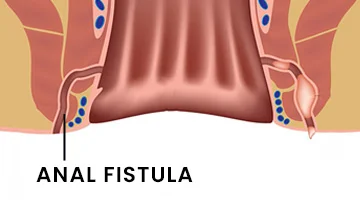FISTULA SURGERY IN Delhi NCR
Swelling and redness in the skin down there? Get rid of it in just 30-Mins with advanced fistula surgery. Glamyo Health offers advanced laser treatment for fistula in Delhi NCR. Our expert doctors will take care of the minimally invasive fistula treatment with round-the-clock assistance from the medical coordinators in Delhi NCR.

1 Lakh+
Happy Patients
350+
Doctors
200+
Hospitals
40+
Cities
40,000+
Surgeries
WHY BOOK FISTULA SURGERY WITH GLAMYO HEALTH?
 Best Surgeons
Best Surgeons
 1 Day Discharge
1 Day Discharge
 Free Follow Ups
Free Follow Ups
 Free Pick Up & Drop Service
Free Pick Up & Drop Service
 All Insurances Covered
All Insurances Covered
 Advanced Procedure
Advanced Procedure
FISTULA SURGERY IN Delhi NCR
A fistula (फिस्टुला) is a condition in which an irregular route forms between two body parts that are not supposed to be joined. Anal Fistula is an infected tunnel between the skin and the anus, the muscular opening at the end of the digestive tract. An anal abscess is a pus-filled cavity caused by infection.
It develops when an anal abscess is drained but not properly healed. It might produce bleeding or discharge in the intestines, which can make passing stools more painful. If the anal fistula becomes severe, drainage may persist for a long time.
Fistula requires immediate treatment. Get in touch with Glamyo Health for the best fistula treatment in Delhi NCR, by the best fistula specialists in Delhi NCR in the best fistula clinic nearby.

FISTULA DOCTORS IN Delhi NCR
View AllFISTULA HOSPITALS & CLINICS IN Delhi NCR
View All
Ruby Hall Clinic
Pune
MON-SAT | 10:00 am - 11:00 pm
Top Treatments
General Specialist,Gallstone,F...
FISTULA SURGERY COST IN Delhi NCR
View All
Type of surgery : Fistula
Hospitalization time : 1 - 2 Days
Cost range : 40,000 INR to 85,000 INR, Avg. 50,000 INR
For the Cost Estimate : CALL NOW
For the Cost Estimate : CALL NOW
FISTULA SURGERY REVIEWS IN Delhi NCR
View All
Om Prakash
Fistula
Hi, my name is Om Prakash, today I had a safe and successful Fistula surgery. During my hospital stay, the staff, doctors and te read more

 Fistula | Surgeries
Fistula | Surgeries Dr. Raj Kumar Singh4
Dr. Raj Kumar Singh4  Delhi Surgical Cente...4.3 (150)
Delhi Surgical Cente...4.3 (150) New Delhi
New Delhi

Reva
Fistula
Hi, my name is Rupesh and my wife ( Reva) had her Fistula surgery. As she was having health issues, we consulted a doctor and he read more

 Fistula | Surgeries
Fistula | Surgeries Dr. Santosh Kishor Naik4
Dr. Santosh Kishor Naik4  SRV Mamata Hospital4.2 (24)
SRV Mamata Hospital4.2 (24) Mumbai
Mumbai

Manepalli B ...
Fistula
Hi, my name is Manepalli Bhupal. I recently had a surgery for which I contacted to Glamyo Health. I had my communication with th read more

 Fistula | Surgeries
Fistula | Surgeries Dr. V Devendran5
Dr. V Devendran5  Sai Thunga Multispec...
Sai Thunga Multispec...  New Delhi
New Delhi

Dinesh kuma ...
Fistula
Hi, my name is Dinesh Kumar Sharma and I recently had Fistula surgery through Glamyo Health. This is an amazing healthcare provi read more

 Fistula | Surgeries
Fistula | Surgeries Dr. Dinesh Thakur5
Dr. Dinesh Thakur5  Avantika Hospital
Avantika Hospital  New Delhi
New Delhi

Vijender si ...
Fistula
Hello, this is Vijender Singh and I have been facing a problem with Fistule. I found out about Glamyo Health through the interne read more

 Fistula | Surgeries
Fistula | Surgeries Dr. Raj Kumar Singh4
Dr. Raj Kumar Singh4  Apollo Spectra Hospi...
Apollo Spectra Hospi...  New Delhi
New Delhi

Shivakumar
Fistula
I had a Fistula problem last few year i suffered many problems. one day i scrolled FB and then i saw Glamyo Health Ad and conta read more

 Fistula | Surgeries
Fistula | Surgeries Dr. Pradeep Kumar N4
Dr. Pradeep Kumar N4  Kanva Sri Sai Hospit...
Kanva Sri Sai Hospit...  Bangalore
Bangalore

Kodigelle M ...
Fistula
Good support from Glmayo Health Care. They supported me at every step and arranged everything at the hospital. Really happy that read more

 Fistula | Surgeries
Fistula | Surgeries Dr. Priyanka Akhilesh Sali5
Dr. Priyanka Akhilesh Sali5  Lexinia Laser Clinic4.6 (1458)
Lexinia Laser Clinic4.6 (1458) Bangalore
Bangalore

Raghavendra ...
Fistula
I was doubtful about getting my Fistula surgery done at first. However, Now I can proudly say that I'm extremely pleased with Gl read more

 Fistula | Surgeries
Fistula | Surgeries Dr. Bala Krishna M Naik5
Dr. Bala Krishna M Naik5  Aveksha Hospital4.4 (19)
Aveksha Hospital4.4 (19) Bangalore
Bangalore

Tanuj
Fistula
You can trust the Glamyo with your health. I contacted them for my Fistula Surgery, and they have given me proper guidance right read more

 Fistula | Surgeries
Fistula | Surgeries Dr. Shuddhatam jain4
Dr. Shuddhatam jain4  SRS HOSPITAL - NOIDA
SRS HOSPITAL - NOIDA  New Delhi
New Delhi

Vijay Prasa ...
Fistula
I got a laser treatment for Fistula under Glamyo Health Care by DR.Niraj Singh in Apex Superspeciality Hospitals. I would like t read more

 Fistula | Surgeries
Fistula | Surgeries Dr. Niraj B. Singh4
Dr. Niraj B. Singh4  Apex Superspeciality...4.2 (65)
Apex Superspeciality...4.2 (65) Mumbai
Mumbai
BENEFITS OF FISTULA LASER SURGERY
- Cuts
- Stitches
- Pain
- Blood Loss
- Infection
- Recovery
Laser Surgery
- No
- No
- Painless
- Low
- No
- Quick recovery
Open Surgery
- Multiple
- Multiple
- Painful
- High
- Chances
- Bed rest required
WORRIED ABOUT PRICE?
Glamyo has made the latest, laser treatment for fistula affordable and accessible to all.
- Interest-Free EMI Facility
- Free Follow-up Consultation
- Free Pickup & Drop For Surgery

FISTULA SURGERY IN Delhi NCR
Fistula/भगन्दर is one of the very prevalent health problems in India. It is usually mistaken for piles and is considered taboo to even talk about. fistula is one of the most painful & disturbing health issues one can come across. It creates a lot of discomfort in daily life activities like sitting, standing, passing motion, wearing tight clothes, choosing the correct diet, etc.
Hence, a fistula requires urgent medical diagnosis & treatment. If not treated on time, fistula can be life-threatening, severely painful & can even cause serious blood loss. Glamyo Health presents a complete guide to help you find the best fistula treatment options and the best fistula surgery alongside the best fistula doctors in the best hospital for Fistula.
Surgical Options for Fistula in Delhi NCR
Laser Surgery - The fistula is closed with the use of a laser, which is a painless operation. The aberrant lining of the fistula is destroyed with a laser beam, and any infection in that area is completely removed. This aids in the healing of the fistula area. In the vast majority of anal fistula situations, this procedure is quite effective.
Fistulotomy - The most common surgical approach for treating an anal fistula is a fistulotomy. This treatment opens up the fistula and removes the whole lining of the tunnel (anal fistula) as well as the infected tissues, allowing it to recover from the inside out. It heals in the same way as a scar does. This procedure takes very little time and is a very successful way to treat a fistula.
If you are looking for fistula treatment in Delhi NCR, then Glamyo Health is the right destination for you. Glamyo Health is a trusted healthcare partner. Glamyo Health has tied up with a plethora of multi and super-speciality hospitals that are equipped with modern equipment and advanced technology.
FREQUENTLY ASKED QUESTIONS
YOUR JOURNEY WITH US
Free Doctor Consultattion

Smooth Hospital Admission

Hassle Free Insurance Approval

Advanced Day Care Surgery

Free Pick Up & Drop Services












 New Delhi
New Delhi  Bangalore
Bangalore  Mumbai
Mumbai  Hyderabad
Hyderabad  Pune
Pune  Chennai
Chennai 
